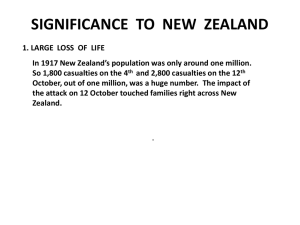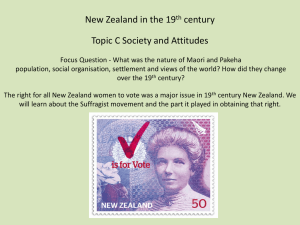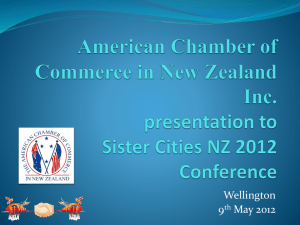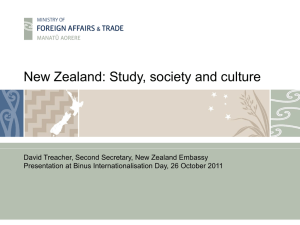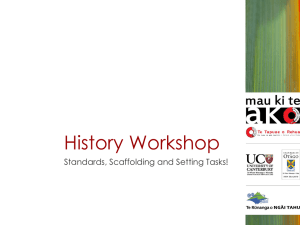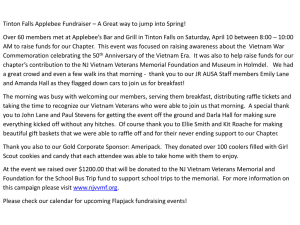Le Quesnoy
advertisement
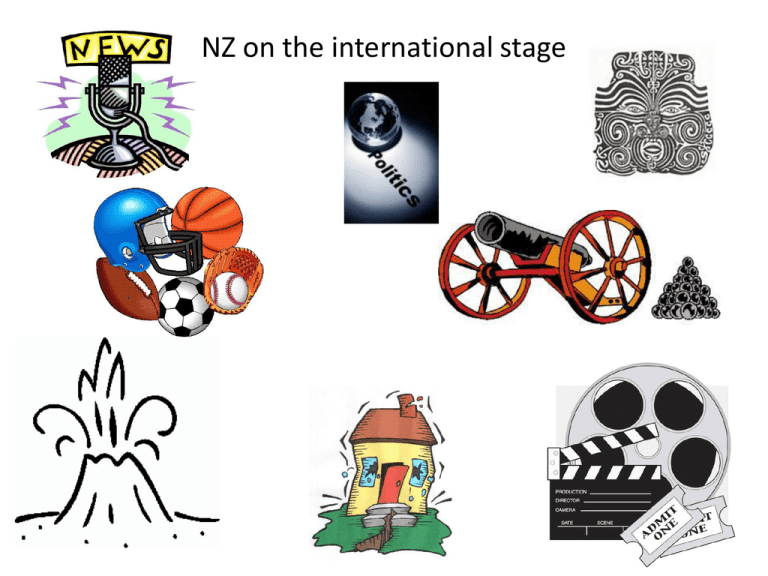
NZ on the international stage Same word family as Culture Other ideas that relate to Culture Culture Similar word Different word for Culture Same word family Other ideas that relate to… Interaction Similar word to… Different word for.. Cultural interaction Film: trench life in the First World War • http://www.nzhistory.net.nz/media/video/fil m-trench-life-in-the-first-world-war The Battle of Le Quesnoy The Germans held Le Quesnoy for almost the entire war, from August 1914 through to its dramatic liberation on 4 November 1918. The New Zealanders scaled the ladders they set against the ancient walls of the town and took the remaining Germans as prisoners. The liberation of Le Quesnoy was just one of the many campaigns that New Zealanders fought on the Western Front, the line that stretched across northern France and Belgium. The majority of New Zealanders killed in the First World War lost their lives in the battles that raged there from 1916 to 1918. Around 12,000 New Zealanders died on the Western Front in two and a half years fighting; this was more than in the entire Second World War. http://www.nzhistory.net.nz/war/le-quesnoy/new-zealand-and-le-quesnoy Capture of the walls of Le Quesnoy by George Edmund Butler, painted in 1920. The painting shows New Zealand soldiers scaling the ancient walls of the old French fortress town before capturing the remaining German defenders on 4 November 1918. http://www.nzhistory.net.nz /media/photo/capture-lequesnoy-painting http://www.nzhistory.net.nz/media_gallery/tid/41 The Landscape http://www.nzhistory.net.nz/media/ph oto/le-quesnoy-street-sign The Landscape Detail of the New Zealand memorial at Le Quesnoy, a bas-relief depicting the scaling of the wall. http://www.nzhistory.net.nz/media/photo/le-quesnoy-memorial The Landscape The monument dedicated to the New Zealand soldiers is an embossed design featuring several symbolic elements: • soldiers scaling the wall of the city of oaks with the help of a ladder; • a winged woman symbolising freedom; • the palm, held out to the soldiers by the winged woman, symbolising victory; • crosses, below and to the left, showing the numerous lives lost on that day; • an epitaph paying homage to the New Zealand soldiers; • ferns, New Zealand’s emblem, were planted at the foot of the memorial; • on both sides of the monument, the emblems of New Zealand and of Le Quesnoy can be distinguished. Embassy of France - in Wellington http://www.ambafrance-nz.org/spip.php?article465 The Landscape Other New Zealand connections in Le Quesnoy are the Rue Nouvelle Zélande within the walls and the Rue d'Averill outside them. The latter is named after Lieutenant Leslie Averill, the intelligence officer of the 4th Battalion, 3rd New Zealand (Rifle) Brigade. He was the first up the ladder during the assault on the town on 4 November, and he maintained a close association with the town for the rest of his life. The town's primary school (l'Ecole du Lieutenant Averill) is also named after him. http://www.nzhistory.net.nz/war/le-quesnoy/visiting-le-quesnoy Perceptions NEW ZEALAND FOOTPRINTS IN LE QUESNOY SOIL Since the victory of 4 November 1918, the passage of these New Zealand soldiers in Le Quesnoy has been marked by numerous physical reminders of the event and of its liberators … Embassy of France - in Wellington http://www.ambafrance-nz.org/spip.php?article465 Perceptions Wreaths lie at the base of the New Zealand memorial at Le Quesnoy, Anzac Day, 1975. The inscription reads 'From the Uttermost Ends of the Earth. De L'Autre Extremité Du Monde'. http://www.nzhistory.net.nz/media/photo/le-quesnoy-wreath-laying Perceptions … the New Zealand soldiers have made their mark in the history of our country forever. To thank them for the incredible military feat that they achieved, the town of Le Quesnoy has offered New Zealanders a part of their wall forever, opposite the memorial. When you visit the memorial, you will find yourself, as it were, in New Zealand. Embassy of France - in Wellington http://www.ambafrance-nz.org/spip.php?article465 Perceptions The Captain of the 2000 All Blacks, Todd Blackadder, recalls [the All Black visit to le Quesnoy] in his recent biography: 'We walked around the town ... [to the memorial] and we laid a wreath there. I was standing next to a Frenchman who had tears streaming down his face. He was moved by the generosity of the New Zealanders all those years ago. It's something you don't understand when you're in New Zealand.' Phil Gifford, Loyal: the Todd Blackadder story, Hodder Moa Beckett, Auckland, 2001 http://www.nzhistory.net.nz/war/le-quesnoy/visiting-le-quesnoy Continuing Connections Despite the large physical distance that separate France from New Zealand, ties between the two countries remain very strong. Le Quesnoy regularly hosts New Zealanders who come to visit the memorial and the cemetery. Lieutenant Averill, who was the first to pass over the town’s wall, visited Le Quesnoy many times and it is now his son, Colin Averill, who attends the ceremonies. Furthermore, a delegation from the New Zealand Embassy in Paris visits the town on ANZAC Day and on 11 November to attend ceremonies each year, in memory of the soldiers. Embassy of France - in Wellington http://www.ambafrance-nz.org/spip.php?article465 Continuing Connections In 2000 a small exhibition covering the events of November 1918 was opened in Le Quesnoy. Organised by La Maison Quercitaine de Nouvelle-Zélande, it contains documents, photographs and other memorabilia relating to the New Zealand involvement in the fighting in the area. One purpose of La Maison is to welcome visitors from New Zealand. http://www.nzhistory.net.nz/war/le-quesnoy/visiting-lequesnoy Continuing Connections This is the head of the procession to the New Zealand Memorial during the Le Quesnoy commemoration, which was attended by both the All Blacks and the New Zealand A team on 5 November 2000. Former All Black player Robbie Deans, one of the coaching staff of the New Zealand A team, can be seen in the foreground on the right. http://www.nzhistory.net.nz/media/photo/le-quesnoy-commemoration-2000 Continuing Connections During their tour of France in 2000, the All Blacks visited Le Quesnoy on 5 November, having earlier in the day laid wreaths at the grave of former All Black captain David Gallaher, killed in the Battle of Passchendaele, at Poperinge in Belgium. At Le Quesnoy they were joined by the New Zealand A team, which was also in France. The rugby players and various officials led a parade to the site of the New Zealand battlefield memorial, where wreaths were laid. http://www.nzhistory.net.nz/war/le-quesnoy/visiting-le-quesnoy Continuing Connections One of the many links between the towns of Le Quesnoy and Cambridge (Waikato, New Zealand) is that Le Quesnoy is known as “ the town of Oaks” and Cambridge as “the town of trees”. Several stained-glass windows in the Saint Andrews of Cambridge church, another such link, are dedicated to the memory of the soldiers who died in the field of honour. The three-part panes that commemorate World War I are of particular interest, especially to Le Quesnoy. In fact the right panel shows soldiers scaling Le Quesnoy’s walls on 4 November 1918, a week before the Armistice. These stained-glass panes were unveiled in December 1923, the day of the inauguration, in France, of the memorial to the soldiers who lost their lives. http://www.ambafrance-nz.org/spip.php?article466 Continuing Connections This is a detail of the war memorial window in St Andrew's Church, Cambridge, New Zealand. The image shows New Zealand soldiers scaling the walls at Le Quesnoy. The caption reads 'Le Quesnoy 4 Nov 1918'. http://www.nzhistory.net.nz/media/photo/l e-quesnoy-memorial-window Worksheet Celebrated in landscape Back to Le Quesnoy to visit Liberators NZ Soldiers The Dead Present day NZ’ers visit – All Blacks Commemorations Le Quesnoy remembered in NZ Memorial Homework Task You are a Le Quesnoy high school student. Your teacher has asked you to produce a piece of creative writing to show your understanding of the Battle of Le Quesnoy and the role of the NZ soldiers. The finished products will be sent to the sister school in Cambridge, NZ. Task: produce a piece of creative writing no longer than a page in length. It could be a letter, a poem, a story, an acrostic……
